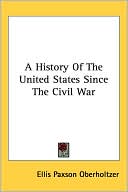

 |

|

The average rating for History of the United States since the Civil War based on 2 reviews is 4.5 stars.
Review # 1 was written on 2016-03-24 00:00:00 Linda Cleghorn Linda CleghornThis collection of about 100 newspaper editorials from the mid-1830s can get a little repetitive, and there's no harm in skimming some of the later ones, but on the whole they give insight into an incredible mind writing at an incredible period of political thought. William Leggett was the editor of the New York Post when it was the mouthpiece of the working-class Democratic Party, but he eventually left to form his own newspapers when his uncompromising antislavery views upset the party bigwigs. Throughout all his writings, however, his cynosure was what he called "the great principle of Equal Rights." He argued that "Whenever a Government assumes the power of discriminating between the different classes of the community, it becomes, in effect, the arbiter of their prosperity." His equal rights belief did not just stand for equality of races or classes, but for all government actions in all things. Taxation and tariffs should be proportional for all products, no regulation should be forced on certain "trades," no combinations should be made illegal, either of merchants or of trade unions, and, most importantly, no corporations should be given special and separate privileges by the legislature. Most of all, Leggett railed against the incorporated banks, and called for the complete "separation of bank and state," analogized to the separation of church and state created by the constitution. Only then would people be entirely free of special "privileged" companies. President Andrew Jackson was Leggett's hero, but Leggett took Jackson's working-class laissez faire to a new level. He attacked New York City pensions for revolutionary war soldiers, a state funded insane asylum, municipal docks, public measurers of coal, the declaration of a religious Thanksgiving Day by the governor, laws against gambling, a free ferry proposal, government mandated prices for both gold and silver (he thought only one price on silver was enough), all copyright law, a public post office, butchers licenses, and so on. This was radical laissez-faire at a new level, which Leggett called, in a formulation that may seem strange today, simply the principles of equal rights and democracy. As extreme as Leggett could seem at first glance, many of his proposals were enacted in this period. By 1838 New York created a "free" banking law, allowing anyone to form their own bank, and soon the principle was expanded to allow anyone to form any corporation, without special legislative sanction or privilege, as Leggett wanted, and this of course spread across the whole country. The federal government in 1840 formed an "independent treasury" to entirely disassociate itself from banks, and Leggett's anti-licensing arguments eventually extended to many formerly regulated trades. This was a forgotten era of deregulation, and Leggett was at the head of it. For those with free market leanings, Leggett is an admirable editorialist, with much food for thought and many stirring words about the necessity for freedom and equality. |
Review # 2 was written on 2008-10-29 00:00:00 Francisco Javier Herranz Sanchez Francisco Javier Herranz Sanchezthe book is comprehensive as fuck. Norling did extensive research to write this. It is a good read if you are at all interested in understanding what the east coast/Atlantic seaboard communities were like over a span of 150 years when america was young. The voices of women tell a different story than what you are used to. |
CAN'T FIND WHAT YOU'RE LOOKING FOR? CLICK HERE!!!